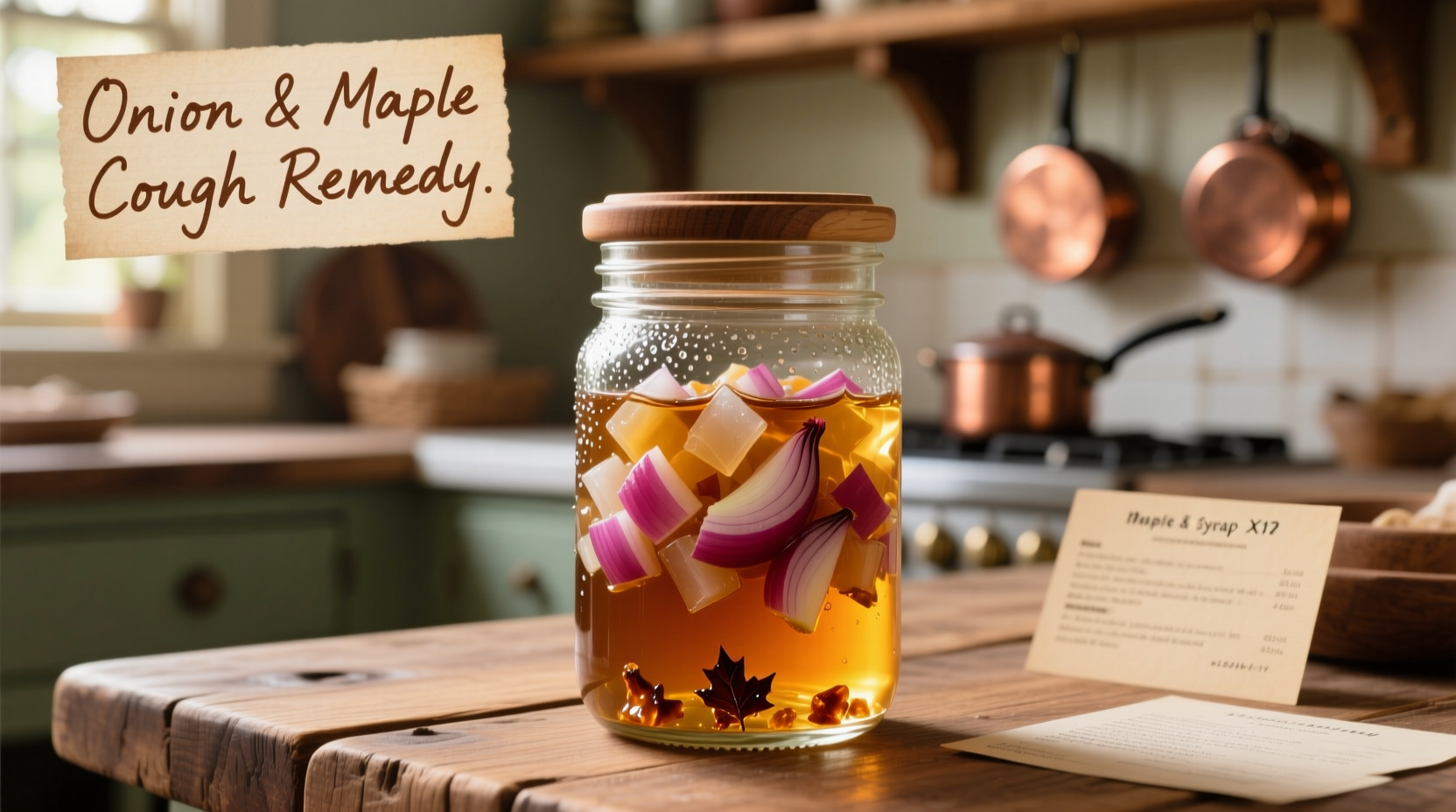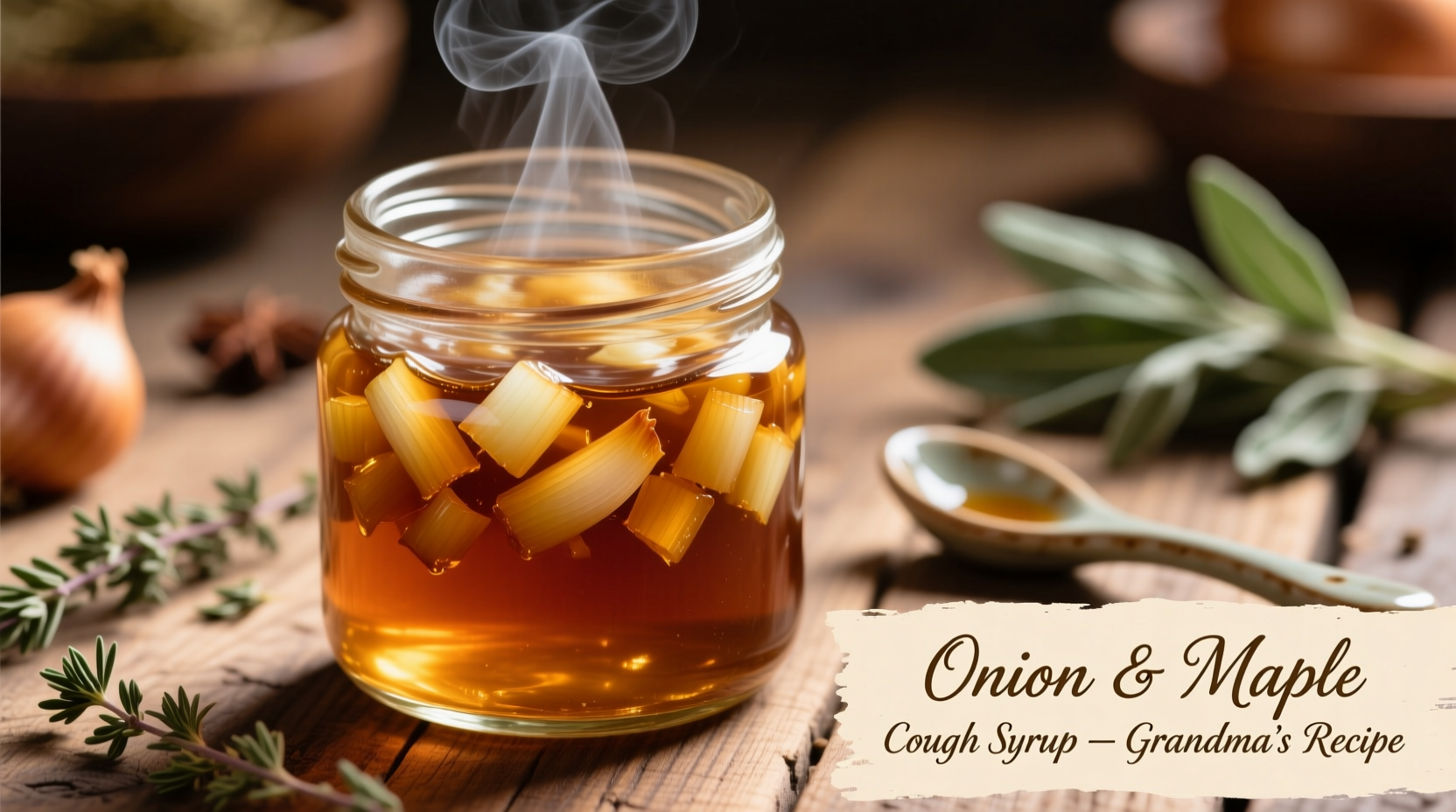The Science Behind This Traditional Remedy
For centuries, cultures worldwide have used onion-based remedies for respiratory discomfort. Modern research helps explain why this combination might offer relief. Onions contain quercetin, a flavonoid with demonstrated anti-inflammatory and antioxidant properties that may help reduce throat irritation. Maple syrup, while primarily a sweetener, creates a viscous solution that coats the throat, providing temporary soothing effects similar to commercial cough syrups.
It's crucial to understand what this remedy can and cannot do. According to the Centers for Disease Control and Prevention, most coughs resolve within 1-3 weeks as part of the natural healing process. This homemade preparation may help manage symptoms during recovery but won't shorten illness duration or treat underlying infections.
When This Remedy Might Help (And When It Won't)
Understanding the limitations of home remedies is essential for safe use. This preparation works best for:
- Mild, dry coughs associated with common colds
- Temporary throat irritation from postnasal drip
- Nighttime coughing that disrupts sleep
Do not use this remedy for:
- Coughs lasting more than 3 weeks
- Productive coughs with colored mucus (could indicate infection)
- Coughs accompanied by fever over 100.4°F (38°C)
- Difficulty breathing or wheezing
| Symptom Type | May Help | Seek Medical Attention |
|---|---|---|
| Dry, tickly cough | ✓ Temporary relief | If lasting more than 10 days |
| Mild sore throat | ✓ Soothing effect | If severe or with fever |
| Nighttime coughing | ✓ May improve sleep | If causing breathing difficulties |
| Cough with colored mucus | ✗ Not recommended | Immediately if persistent |
Step-by-Step Preparation Guide
Creating effective homemade cough syrup requires proper technique to maximize potential benefits while ensuring safety. Follow these evidence-based instructions:
Ingredients You'll Need
- 1 medium yellow onion (approximately 150g)
- 2 tablespoons pure maple syrup (grade A or B)
- 1 teaspoon fresh lemon juice (optional)
Equipment Checklist
- Sharp knife and cutting board
- Small glass jar with lid
- Fine mesh strainer
- Small saucepan
- Storage container with tight-fitting lid
Detailed Preparation Process
- Prepare the onion: Peel and finely chop the onion. For maximum extraction, you can dice it very small or use a food processor.
- Layer ingredients: In your glass jar, alternate layers of onion and maple syrup, finishing with syrup on top. The syrup should completely cover the onion.
- Wait for extraction: Cover tightly and let sit at room temperature for 4-6 hours. The onion will release its juices into the syrup through osmosis.
- Strain the mixture: After waiting period, strain the liquid into a clean container, pressing gently on the onion solids to extract maximum liquid.
- Optional enhancement: For additional soothing properties, stir in lemon juice which may help cut through mucus.
- Storage: Keep in refrigerator for up to 1 week. The cold temperature enhances the soothing effect.

Using Your Remedy Effectively
Proper usage maximizes potential benefits while minimizing risks:
Dosage Guidelines
- Adults: 1-2 teaspoons as needed, up to 4 times daily
- Children 2-6 years: 1/2-1 teaspoon up to 3 times daily
- Children 6-12 years: 1 teaspoon up to 4 times daily
Important safety note: Do not give to children under 1 year due to potential botulism risk from natural spores that may be present in sweeteners, even though maple syrup carries lower risk than honey. Always consult your pediatrician before giving any home remedy to children.
Maximizing Effectiveness
- Take after meals to prevent potential stomach upset
- Allow the syrup to coat your throat by swallowing slowly
- Use consistently for 2-3 days to assess effectiveness
- Combine with other supportive measures: hydration, rest, humidified air
Evidence-Based Context
Understanding the historical and scientific context helps set realistic expectations for this traditional remedy.
Historical Timeline of Onion Remedies
- Ancient Egypt (3000 BCE): Onions documented in medical papyri for respiratory treatments
- Renaissance Europe: Onion syrups commonly prescribed for coughs and colds
- 19th Century: Featured in household remedy guides across North America and Europe
- Modern Research: Scientific studies examining onion compounds' potential anti-inflammatory effects
What Research Actually Shows
While comprehensive clinical trials specifically on onion-maple syrup combinations are limited, research provides some insights:
- A 2014 study in the Iranian Journal of Basic Medical Sciences found onion extract demonstrated significant antitussive (cough-suppressing) activity in animal models.
- Research on quercetin (abundant in onions) shows anti-inflammatory properties that may help reduce throat irritation.
- Maple syrup contains polyphenols with potential antioxidant effects, though less studied than honey for respiratory benefits.
Important Considerations Before Trying This Remedy
Responsible use of home remedies requires understanding their proper context:
- Not a medical treatment: This remedy addresses symptoms only, not underlying causes
- Diabetes considerations: Maple syrup contains sugars; monitor intake if managing blood sugar
- Allergy awareness: Test with small amount first if onion allergy is possible
- Medication interactions: Consult your doctor if taking prescription cough medications
Remember the CDC's guidance: "Most coughs go away on their own. If your cough lasts more than 2-3 weeks, see your doctor to determine the cause." Persistent coughs may indicate conditions requiring medical treatment.
When to Consult a Healthcare Professional
Knowing when to seek medical care is crucial for safe home remedy use:
- Cough lasting longer than 10-14 days
- High fever (over 100.4°F or 38°C)
- Difficulty breathing or shortness of breath
- Coughing up blood or rust-colored mucus
- Wheezing or whistling sounds when breathing
- Symptoms worsening after initial improvement
For children, contact a healthcare provider if:
- Cough interferes with eating, drinking, or sleeping
- Child appears lethargic or unusually irritable
- Infants have trouble breathing or feeding
- Symptoms persist beyond 7 days











 浙公网安备
33010002000092号
浙公网安备
33010002000092号 浙B2-20120091-4
浙B2-20120091-4